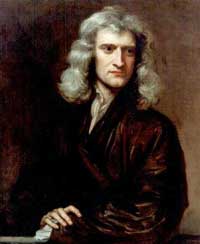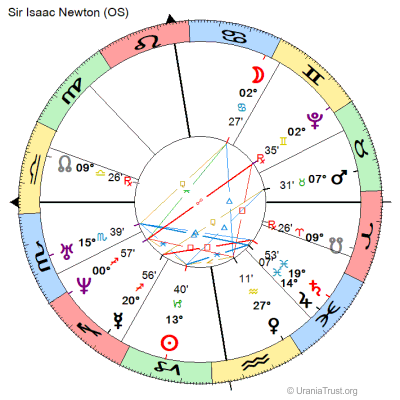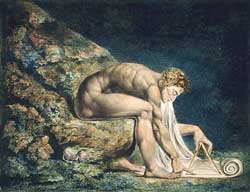 Sir Isaac Newton
Sir Isaac Newton25 December 1642 (OS), 1:38am
Wolsthorpe Manor, England
Placidus Houses, True Node
Geocentric, Tropical
(Source Notes)
Portrait of Sir Isaac Newton,
by Sir Godfrey Kneller, 1689

Isaac Newton was born (prematurely) on 25 December 1642 (OS), three months after the death of his father, at Woolsthorpe Manor, near the village of Colsterworth in Lincolnshire and died on 20 March 1727 (OS) in London1. Such was his eminence that he was buried (on 4 April) in Westminster Abbey, and a monument erected to his memory.
In preparing this article I have made use of Richard Westfall’s scholarly and comprehensive biography of Newton2. There is far more to say about Newton than can be included in a short note such as this. Interested readers should consult the biographies and websites included in the bibliography at the end of this article.
Newton was of one of the greatest scientists there has ever been. Along with Einstein, he symbolises the ability of the human mind to unlock the deepest secrets of nature. Newton's contributions include the theory of gravity which allows the accurate calculation of planetary positions, the discovery that white light can be split into a spectrum of colours, and the creation of the mathematical tool called calculus, without which most of modern science would not be possible. His practical scientific ability is exemplified by his construction of the first practical reflecting telescope; a design still used today for large telescopes, a design know as a Newtonian reflector. When Newton died, Alexander Pope wrote the famous epitaph that captures the image we still have of Newton as the great rational scientist:
Nature and nature's laws lay hid in night,
God said "Let Newton be" and all was light.
The scientist, the discoverer of order in nature and the cosmos, the revealer of “nature’s laws” is the public face we remember, but there was a much less conventional side to Newton that is not well known, and it is this side that I wish to explore. I will concentrate on three aspects, Newton the alchemist, Newton the student of theology and Biblical prophecy, and Newton’s reputed interest in astrology.
Newton’s Library and the Keynes Papers
Before delving further into Newton’s work, I should give some details about his books and papers. Harrison’s book on Newton’s library3 has been invaluable in this.
When Newton died, his estate was to be divided between his eight (half) nephews and nieces. The court ordered that a full inventory be made including all the “goods, chattels and credits of Sir Isaac Newton”. The record was written on a series of vellum skins sewn together, and when complete made a document seventeen feet long! In addition to the books, the list records “... together with one hundred weight of pamphlets and Wast books”, Wast books being what we know as notebooks.
In a library of 1763 books, (1752 different titles excluding duplicates) he had 369 books on what we would call scientific subjects, plus 169 on Alchemy (including many of the important texts on the subject copied in his own hand), there were also 477 books on Theology. He possessed only four books on astrology; two of these were treatises on astrology, one was an almanac, and one was a refutation of astrology (I will return to this below).
In addition to the books, Newton left a very large collection of notes and papers, many on alchemy, theology and prophecy. These papers were packed in a trunk and stored after his death, hardly being looked at and not catalogued until they were auctioned in 1936 by their owner, the Earl of Portsmouth (a descendant of Newton’s niece). Many of the lots were bought by the economist J M Keynes, who later also collected a number of the lots he had missed at auction. These papers are now in the library of King’s College, Cambridge and account for about half of the original collection. Many of the remaining lots were bought by Professor Shalom Yehuda and later donated to the National Library of Israel. It is from these two collections that our knowledge of Newton’s interests outside mechanistic science comes.
Schoolboy and Student
Newton displayed his practical scientific abilities while still at school: making a working model of a windmill, a water clock, various complex sundials, and devising a method to determine the strength of a storm, by first jumping with the wind and then against it, and comparing the distances with a jump on a calm day4.
On 5th June 1661 (OS), Newton was admitted as a member of Trinity College, Cambridge and a month later, on 8th July, he matriculated (became a member of the university).
During his time as an undergraduate an incident occurred that may help us understand Newton’s relationship with astrology. Stourbridge Fair was held each year in September on Stourbridge Common just outside Cambridge (now within the city boundary) and was one of the largest fairs in England. According to Conduitt (see note5 for the full quote) Newton, when visiting the fair, probably in 1663, found for sale, and bought, a book on judicial astrology. There is no reference to Newton pursuing the study of astrology further, but the book did have an important consequence. Finding that he could not perform all the astronomical calculations necessary to erect a chart, Newton bought a copy of Euclid’s theorems on geometry and taught himself what he needed to know to calculate a chart. This knowledge of geometry became the foundation for his later work in astronomy, which lead to his gravitational theory.
Newton and Alchemy
 Sir Isaac Newton, by William Blake
Sir Isaac Newton, by William BlakeWhen Newton went to Trinity in 1661, the 'Scientific Revolution’ was already well advanced. The world view was changing from qualitative to quantitative. As part of this, the art of alchemy was slowly becoming the science of chemistry. In the 17th century and earlier, alchemy was animistic, and so contradictory in its very essence to the new mechanical science. Alchemists believed that life, rather than mechanism was at the heart of nature.
Yet, the great scientist Newton spend over thirty years involved with alchemy, copying alchemical texts and making notes on his own alchemical experiments. He corresponded with many of the leading alchemists of his time, many of them on the continent, and had an 'elabratory’ in Trinity where he conducted his experiments. Newton’s papers that have survived contain over one million words on alchemy in Newton’s own hand, and at his death, his library contained 169 books on alchemy and numerous pamphlets and notes. His writings indicate that one of his goals in alchemy may have been to discover 'The Philosopher's Stone’, the substance reputed to turn base metals into gold. In his notes on alchemical research we find the idea that nature, and so the elements (including base metals) were, in some way, alive.
Student of Theology and Biblical Prophecy
Early in his life, Newton had abandoned orthodox Trinitarian beliefs, holding to a form of the Arian heresy. This was a very dangerous belief to hold, it was even more dangerous to write pamphlets (unpublished) setting-out his beliefs. Being an anti-Trinitarian he refused to take Holy Orders and so needed to obtain a special dispensation to hold his Fellowship and the Lucasian Chair in mathematics, at a time when ordination in the Anglican Church was a requirement for holding such positions. He received the dispensation from the King in 1675. Had the extent of his views become known, he would probably have been stripped of both his Fellowship and Chair.
There is not space here to go into detail about Newton’s other researches of a non-scientific nature, but a brief summary will give an impression of how the actuality differs from the conventional view of Newton. He regarded the Universe as a secret, which could be unlocked by pure thought applied to the clues left by God. He wrote extensively about the Temple of Solomon and its measurements, which he believed embodied a coded form of sacred knowledge. He studied the Biblical books of Daniel and Revelations and wrote on the correct method of understanding Biblical prophecy, and on the date of the final judgement and the end of the current world. (He concluded it would not be earlier than 2060.) He wrote on the chronology of ancient kingdoms, and the location of Atlantis. These researches occupied much of his time at Cambridge; indeed his alchemical, theological and Biblical research occupied far more of his time than the scientific work for which he is famous!
Newton and Astrology
We must now consider Newton’s reputed interest in astrology. Apart from his purchase of a book on judicial astrology when an undergraduate (and Conduitt’s assertion that Newton did not pursue the subject) we have no record of Newton having any interest in, let alone his practicing, astrology.
There is a story, much quoted in astrological articles and books, about a dispute between Newton and Halley (of the comet fame), supposedly about astrology, in which Newton replies to a remark by Halley "I have studied these things, you have not". In astrological writings no source is ever given and no context. In fact, it comes from Sir David Brewster's biography of Newton6 published in 1831. According to Brewster, the dispute was about religion and theology. There is no mention of astrology. To quote Brewster: "When Dr Halley ventured to say anything disrespectful to religion, he (Newton) invariably checked him and said, 'I have studied these things; you have not'." Brewster states that his source was a Professor Rigaud of Oxford who heard it from Dr Maskelyne, the Astronomer Royal from 1765 to 1811.
As far as I can tell, the first mention of astrology in connection with this remark was about 1910. It seems likely that the quote has been taken out of context and its astrological subject erroneously added, and perpetuated in the astrological literature over the last hundred years without a proper reference to its source. In addition, there is no other evidence connecting Newton to astrology. Indeed, if he had practiced astrology he would have needed many books on the subject, not the four he had (one of which was a refutation). We have to conclude that Newton was not an astrologer, but he was not a simple rationalist scientist either.
Newton, the Man
I will conclude with an extended quote from the lecture Newton, the Man by J M Keynes7, written for the 300th anniversary of Newton’s birth.
I believe that Newton was different from the conventional picture of him. But I do not believe he was less great. He was less ordinary, more extraordinary, than the nineteenth century cared to make him out. Geniuses are very peculiar. Let no one here suppose that my object today is to lessen, by describing, Cambridge's greatest son. I am trying rather to see him as his own friends and contemporaries saw him. And they without exception regarded him as one of the greatest of men.
In the eighteenth century and since, Newton came to be thought of as the first and greatest of the modern age of scientists, a rationalist, one who taught us to think on the lines of cold and untinctured reason.
I do not see him in this light. I do not think that any one who has pored over the contents of that box which he packed up when he finally left Cambridge in 1696 and which, though partly dispersed, have come down to us, can see him like that. Newton was not the first of the age of reason. He was the last of the magicians, the last of the Babylonians and Sumerians, the last great mind which looked out on the visible and intellectual world with the same eyes as those who began to build our intellectual inheritance rather less than 10,000 years ago. Isaac Newton, a posthumous child born with no father on Christmas Day, 1642, was the last wonderchild to whom the Magi could do sincere and appropriate homage.
Notes and Bibliography
1 Dates are indicated as Old Style (OS) where appropriate and all years are given as if the year started on 1st January, rather than using the 1661/2 notation for dates before the change of year on 25 March each year.
2 Westfall, Richard S. Never at Rest: A biography of Isaac Newton, Cambridge, CUP, 1980 (A detailed biography of 908 pages, a shorter and more accessible biography is: Westfall, Richard S. The Life of Isaac Newton, Cambridge: CUP, 1993, 328 pages)
3 Harrison, John. The Library of Isaac Newton, Cambridge, CUP 1978
4 Stukeley, William. Memoirs of Sir Isaac Newton's life, by William Stukeley ... 1752; being some account of his family and chiefly of the junior part of his life ... Edited by A. Hastings White. London, Taylor and Francis, 1936
5 Conduitt, John. Draft account of Newton’s life at Cambridge (A collection of manuscript notes intended for a life of Newton), Keynes MS. 130.04 in the library of Kings College, Cambridge. John Conduitt was the husband of Newton’s niece, Catherine Barton Conduitt. The relevant section is:
(Sheet 1 recto.) ... he bought a book of Iudicial Astrology out of a curiosity to see what there was in that science & read in it till he came to a figure of the heavens which he could not understand for want of being acquainted with Trigonometry, & to understand the ground of that bought an English Euclid with an Index of all the problems at the end of it & only turned to two or three which he thought necessary for his purpose & read nothing but the titles of them finding them so easy & self evident that he wondered any body would be at the pains of writing a demonstration of them & laid Euclid aside as a trifling book, & was soon convinced of the vanity & emptiness of the pretended science of Iudicial astrology
6 Brewster, Sir David. The life of Sir Isaac Newton. 1st edition, London, John Murray, 1831
7 Keynes, J.M. "Newton, the Man"; Proceedings of the Royal Society Newton Tercentenary Celebrations, 15–19 July 1946, Cambridge, 1947. Full text available at https://mathshistory.st-andrews.ac.uk/Extras/Keynes_Newton/
Websites of interest
https://en.wikipedia.org/wiki/Isaac_Newton
https://en.wikipedia.org/wiki/Isaac_Newton's_occult_studies
https://www.newtonproject.ox.ac.uk/
https://www.nli.org.il/en/discover/humanities/newton-manuscripts
Graham Bates
Graham Bates is co-author of Money and the Markets: An Astrological Guide, along with Jane Chrzanowska Bowles.
